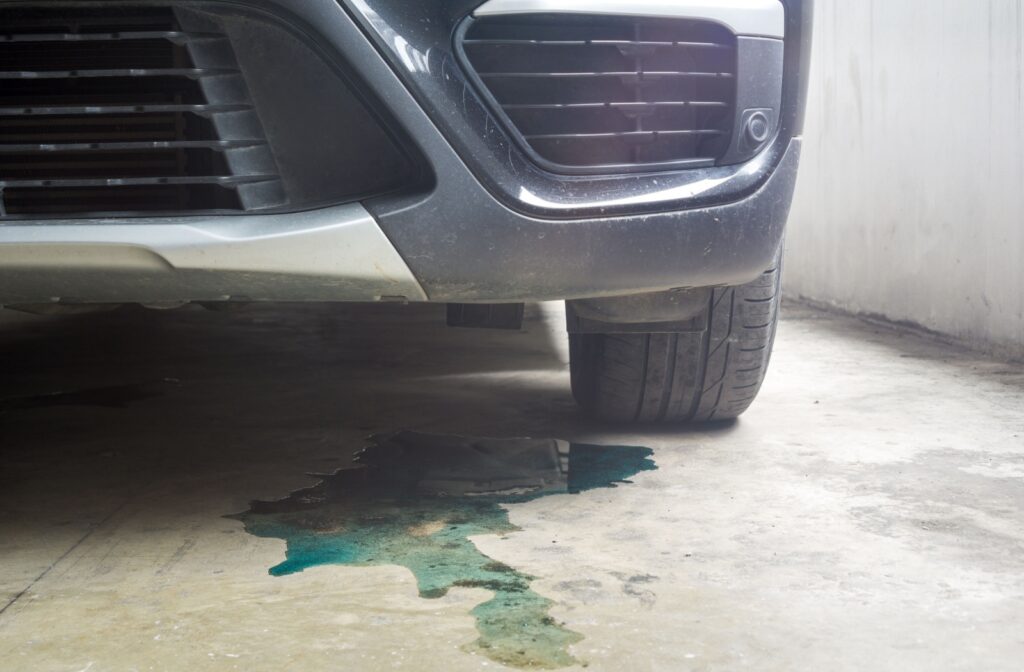Seeing the temperature gauge slowly increase in your car can be unsettling. The higher it gets, the more uncomfortable the air will feel.
Whether a minor inconvenience or a major issue, an overheating car can result in costly repairs or leave you stranded on the side of the road. The best way to prevent this is to understand why it happens.
When a car overheats, it is often due to a problem with the radiator. This is the part of the engine responsible for cooling the hot coolant that comes from the engine. When the coolant enters the radiator, it is hot because it has picked up heat from the engine. It is the radiator that helps cool down the coolant before sending it back to the engine.
How Radiators Work
It is important to begin by understanding the vital role a radiator plays in your vehicle’s cooling system. The radiator is responsible for transferring heat from the engine coolant to the outside air, which helps maintain the proper operating temperature for your car’s engine.
As the coolant absorbs heat from the engine, its temperature increases significantly. The radiator removes heat from the coolant, dispersing it appropriately before cycling the cooled liquid back to the engine to repeat the process.
This helps transfer the heat from the engine so it remains at a proper temperature. When functioning properly, this helps your car stay cool and comfortable.
What Causes a Car to Overheat?
While the radiator is a crucial part of a properly functioning engine, it can still be vulnerable to problems. Often, this is due to:
- Coolant leaks
- Corrosion
- Blockages
- Thermostat problems

Coolant Leaks
Sometimes, a cracked or damaged hose can cause coolant to leak. This makes it significantly more difficult—or impossible—to transfer engine heat. It is crucial to check for leaks regularly and fill the radiator with the appropriate coolant.
Corrosion
The metal used to make your radiator may be vulnerable to corrosion or general wear and tear, especially if exposed to overly stressful environmental conditions. If you notice any visible damage to your radiator, it’s time to visit a professional.
Blockages
Debris, sludge, or other substances can accumulate in the radiator and cause blockages. When the radiator is clogged, the coolant cannot flow as it should, leading to ineffective cooling and an overheated engine.
When topping off your coolant or flushing the system, check the consistency of the coolant. If you notice a problem, it can help to flush the entire radiator system. This can be done with the help of an experienced radiator repair specialist.
Thermostat Problems
The thermostat controls the flow of coolant through the engine and radiator. If it fails, the engine may not receive the necessary cooling effect from the radiator, causing temperatures to soar.
How to Tell if Your Radiator Is Failing
Recognizing the signs of a failing radiator can save you from a potentially dangerous overheating situation. This is about much more than just feeling comfortable in your car. Extended overheating can cause significant damage to your engine and lead to costly repairs down the road. To stay ahead of potential damage, keep an eye out for the following signs:
- Constant high engine temperature gauge readings: If the gauge on your dashboard constantly shows that the engine is running hot, it can be a sign that the radiator is no longer functioning at full capacity.
- Low coolant levels: If you have to frequently top off your coolant or notice that the levels are consistently low, you likely have a leak somewhere in your vehicle’s cooling system.
- Discolouration in the coolant: If your coolant appears darker than when put in, you may have oil or rust in the radiator or lines.
It can help to regularly inspect your radiator for signs of physical damage, such as steam coming from under the hood or a strong smell in your vehicle. These can be signs that the radiator is leaking, malfunctioning, or failing.
By keeping a close eye on these warning signs and addressing them promptly, you can maintain a healthy cooling system and avoid the troubles associated with car overheating—while keeping the air in your vehicle at a much more comfortable level.
What to Do if Your Radiator Needs Maintenance
When you suspect a radiator issue, the best course of action is to contact a team of experienced professionals. Attempting to diagnose and fix radiator problems without proper knowledge and tools can lead to further damage, and puts you at risk of hurting yourself.
A trained mechanic can perform a radiator flush, remove blockages, replace damaged components, and ensure your engine is properly cooled. They’ll also check other areas of your vehicle’s cooling system to preemptively tackle potential issues.
By seeking professional support, you can keep your radiator running strong, without putting yourself or your vehicle at risk.
Visit Our Team at City Wide Radiator
Recognizing signs of radiator issues is essential to keep your vehicle in optimal condition. If you notice any problems with your radiator, reach out to our team at City Wide Radiator. Our team is here to help you keep your radiator running well, so contact us today.
